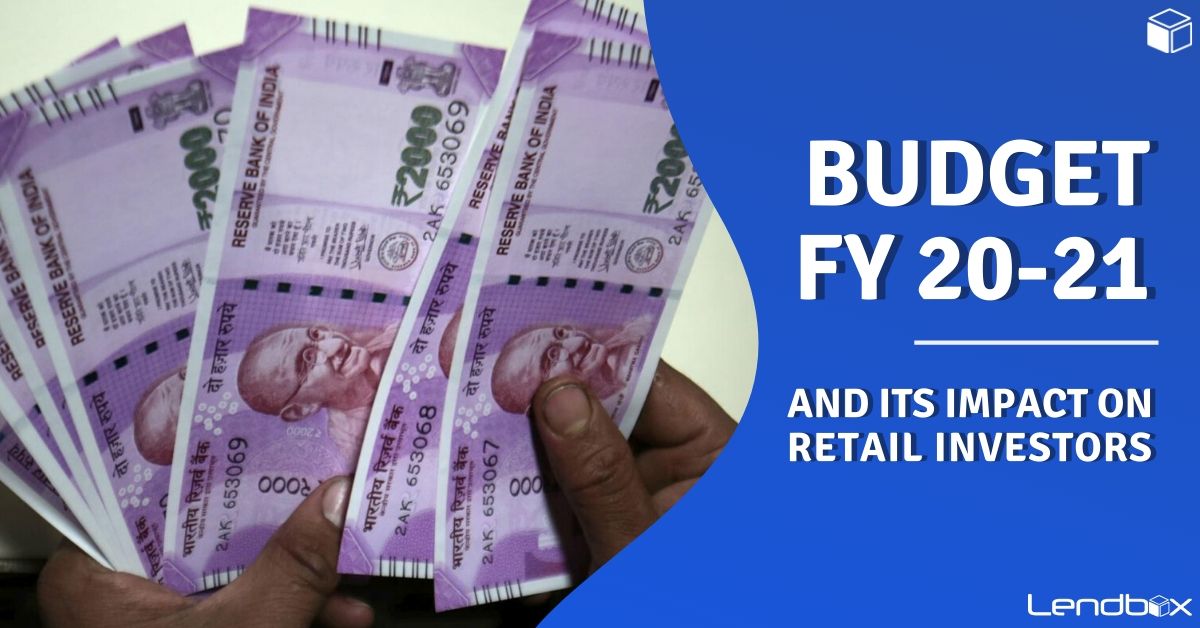Budget FY20-21 and its impact on the Indian Retail Investors
On Saturday 1st February 2020, India's Finance Minister Niramala Sitharaman released the Union Budget for the financial year 2020-2021 by delivering the longest budget speech to have ever been recorded. The speech was met with both cheers and opposition from the house as is the case every year given India's political landscape.
The stock markets reacted quite sharply to the budget with the Sensex plunging by almost a 1000 points before closing. But what does the budget really mean for the common man and what is the short-term impact on our lives and on the life of a retail investor and an ordinary tax-paying citizen. Lendbox has compiled key facts to help you learn what this budget holds in store for you and how it affects your tax scheme with and without exemptions.

India is currently experiencing an economic slowdown and has been apparent since the end of 2018. The government has taken several measures to spruce up economic activity such as cutting the corporate tax rate but these measures are yet to show any results.
With the 2020-2021 budget, the government expects the GDP growth to pick up as it states that the slowdown has bottomed out. Experts have touted this budget as disappointing to downright dangerous. However, the macroeconomic effects of most of the policy changes may never be experienced by the common man within the next one year, so let us discuss the things which may have some impact.
Income tax rates and system change, with and without exemptions-
The new budget has introduced a "simplified" tax system where the rates have been considerably reduced from the old regime, however, there's a catch, under the new system the taxpayers cannot avail any of the exemptions which are available in the old regime such as Section 80C. The rates in the new regime can be seen in the table below:
|
Income Tax Slab |
Tax Rate |
|
Up to ₹ 2.5 lakh |
NIL |
|
₹ 2.5 lakh to ₹ 5 lakh |
5% (Tax rebate of ₹ 12,500 available under section 87A) |
|
₹ 5 lakh to ₹ 7.5 lakh |
10% |
|
₹ 7.5 lakh to ₹ 10 lakh |
15% |
|
₹ 10 lakh to ₹ 12.5 lakh |
20% |
|
₹ 12.5 lakh to ₹ 15 lakh |
25% |
|
₹ 15 lakh and above |
30% |
The tax calculated on the basis of such rates will be subject to health and education cess of 4%.
The FM noted individuals can choose to remain in the old regime which has the old rates but also the benefit of the exemptions or they can take advantage of the new lower rates but would have to forgo the benefits they could have availed under any applicable exemptions.
Nirmala Sitharaman explained the model offered above to with an example: "An individual earning ₹ 15 lakh in a year and not benefiting any tax exemptions would have to pay a tax of ₹ 2,73,000 under the old regime as compared ₹ 1,95,000 under the new system, a full ₹ 78,000 more than what he would have paid under the new regime.
Below is the table shared by the finance ministry with the general public:
Scenario for concessional tax option to Individual/ HUF
|
S No |
Total Income |
Old |
New |
Difference |
|
|
Amount |
%ge of old liability |
||||
|
1 |
5,00,000 |
Nil |
He will not opt for |
Nil |
NA |
|
2 |
6,00,000 |
33,800 |
23,400 |
10,400 |
30.77 |
|
3 |
7,00,000 |
54,600 |
33,800 |
20,800 |
38.10 |
|
4 |
7,50,000 |
65,000 |
39,000 |
26,000 |
40.00 |
|
5 |
8,00,000 |
75,400 |
46,800 |
28,600 |
37.93 |
|
6 |
9,00,000 |
96,200 |
62,400 |
33,800 |
35.14 |
|
7 |
10,00,000 |
1,17,000 |
78,000 |
39,000 |
33.33 |
|
8 |
11,00,000 |
1,48,200 |
98,800 |
49,400 |
33.33 |
|
9 |
12,00,000 |
1,79,400 |
1,19,600 |
59,800 |
33.33 |
|
10 |
12,50,000 |
1,95,000 |
1,30,000 |
65,000 |
33.33 |
|
11 |
13,00,000 |
2,10,600 |
1,43,000 |
67,600 |
32.10 |
|
12 |
14,00,000 |
2,41,800 |
1,69,000 |
72,800 |
30.11 |
|
13 |
15,00,000 |
2,73,000 |
1,95,000 |
78,000 |
28.57 |
Even though the FM claims that individuals earnings upto ₹ 15 lakh would be saving tax under the new regime, experts claim that overall individuals would be paying more tax due to the lack of exemptions which are currently available.
Dividend Distribution Tax abolished
The Union Budget abolished the Dividend Distribution Tax, which companies had to pay while distributing dividends to its shareholders. Now, the entire tax burden would be passed onto the recipients of the dividends.
Till now, organizations were required to pay DDT at 15 per cent, however, including additional charges and cess the effective rate reached 20.35 per cent and individuals were exempt from paying any tax upto ₹ 10 lakh.
Experts believe this will increase the attractiveness of paying dividends by companies since it removes any tax burden and more cash in hand of the recipients. It will however, increase the tax burden on the dividend receivers. Evidently, it can also be taken negatively for small investors as they would be liable to pay tax on dividends received less than ₹ 10 lakh.
Changes in ESOP taxing
In her Budget speech, Sitharaman reported that tax on ESOPs given to employees to be deferred by 5 years or till the employees leave the company, whichever is prior. This is definitely being considered a good move by all stakeholders as it reduces the overall tax burden and makes the ESOP process more attractive.
Securities issued under Employee Stock Benefit Plans by employers are taxable in the hands of the employees at the time of their exercise (i.e. allotment). In case of eligible start-ups, the payment of tax on such benefit is proposed to be deferred to within 14 days after (i) 5 years from the end of financial year in which options are exercised, or (ii) date of sale of such security by the employee or (iii) the date of the employee ceasing employment with the company, whichever is earliest.
Changes For NRIs
As per existing tax policies, an Indian Citizen or Person of Indian Origin, who being outside India, comes on a visit to India in any financial year, would be considered as a resident of India, if such individual stays in India for 182 days or more. The amendment proposed by the budget provides for such an individual to be resident in India in either of the two scenarios - (i) the individual's stay in India during the financial year is 182 days or more; or (ii) the individual's stay in India is 120 days or more in the current financial year and 365 days or more in the preceding 4 financial years.
Additionally, as per the proposed amendments, a citizen of India deemed to be a resident of India in any financial year, will be liable to pay tax if he generates any income in India, irrespective of whether his current place of jurisdiction has income tax or not.
Overall better tax administration
A system to allot Permanent Account Number (PAN) based on Aadhaar would be introduced by which PAN would be instantly allotted online without requirement to fill up detailed application form.
Lastly, the FM also noted that she will work to put an end to Tax harassment by authorities and will be instituting changes to ensure that officials do harass individuals for the same. Wealth creation should be ethical and harassment cannot be tolerated is the stance taken by our FM.
Overall, the changes in policies will not have a major impact on the day to day lives of the ordinary tax paying citizen, it can appeal to individuals who were not taking advantages of the current exemptions to move to the new regime but other than that it is a budget which focussed more on macro economic factors and the need to economic activity and we hope that it can be successful in achieving the same.
Find your wealth creation plan with Lendbox! Click on the button below to register for free and our wealth managers will connect to explain our products.

